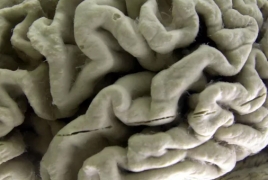Endurance exercise may slow down Alzheimer’s October 5, 2019 - 14:37 AMT PanARMENIAN.Net - Currently, there is no cure for Alzheimer’s disease, and previous research has discovered that the rate of progression and changes in brain atrophy—or the loss of nerve cells called neurons in your brain—often varies by individual, making the condition even tougher to predict and treat. But a new study published in the Journal of Alzheimer’s Disease joins a growing tide of research about one possible speed bump for dementia and Alzheimer’s: regular exercise. Researchers at UT Southwestern Medical Center compared cognitive function and brain volume in 70 sedentary, older adults with memory issues and mild cognitive impairment. They separated them into two groups, one doing aerobic exercise and the other concentrating on stretching. The dose of aerobic training was based on each individual’s fitness level, assessed with VO2 testing, But no matter what their starting point, every participant in that group progressively increased the frequency and intensity of their exercise sessions over time, starting with three times per week for about a half hour at 75 to 85 percent of max heart rate. By week 26, they were doing four to five sessions per week for about 40 minutes per time, at 85 to 90 percent of max heart rate for the workout. The stretching group participants stayed at below 50 percent of max heart rate and focused on full-body stretches, with resistance bands introduced about halfway through the program. At the end of a year, both groups showed evidence of slightly improved neuropsychological scores, and scored about the same on cognitive tests. Memory and executive function—which includes things like reasoning and problem-solving skills—also improved for all participants. But when the researchers looked at how the buildup changed of amyloid—a type of plaque that’s considered a hallmark of Alzheimer’s and dementia because it destroys neurons in the brain—they saw some important differences: Those in the exercise group who had amyloid buildup at the start of the study experienced slightly less volume reduction in their hippocampus—the part of the brain involved in memory—compared to those in the stretching group. This is a big deal because previous research has shown that people who have more amyloid beta also tend to experience more shrinkage in that part of the brain. So if exercise can keep the amyloid in check, then that could mean dementia could progress at a slower rate. Authorities said a total of 192 Azerbaijani troops were killed and 511 were wounded during Azerbaijan’s offensive. In 2023, the Azerbaijani government will increase the country’s defense budget by more than 1.1 billion manats ($650 million). The bill, published on Monday, is designed to "eliminate the shortcomings of an unreasonably broad interpretation of the key concept of "compatriot". The earthquake caused a temporary blackout, damaged many buildings and closed a number of rural roads. Partner news |